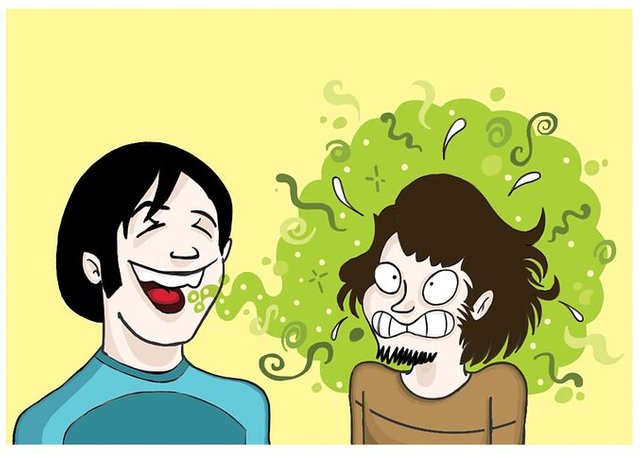Halitosis (Bad breath)
Halitosis is a medical term for bad breath. More than 100 million people suffer from chronic halitosis, or bad breath. The bad odor emanates from a sulfur compound produced from the decay and debris of food particles and bacteria in the mouth, gums, tongue and sometimes in between the teeth because of the plaque it could form. Halitosis is part of the common reasons people have to visit the dental clinic for checks after gum diseases and tooth decay.
Bad breath may happen in people who have a medical condition or an infection, kidney problems or failure, diabetes or a liver breakdown. Cancer patients undergoing radiation therapy can experience dry mouth. Even anxiety, our eating habit, age, snoring and hormonal changes has an effect on our breath.
Bad breath is so significant in the sense that it is easily noticed and in many cases causes a psychological distress.
Symptoms
The odor of breath can vary depending on the cause of the underlying problem. It is best to enquire from a close friend or relative to check your mouth odor, as it can be problematic to assess it yourself.
If no one is present, one technique of checking the odor is to lick your wrist, leave it to dry, and then smell it. A bad smell on this area of the wrist is to be expected to suggest that you have halitosis.
Some persons are concerned about their breath even though they may have no or little mouth odor. This condition is called halitophobia and can lead to obsessive mouth-cleansing behavior.
What causes bad breath?

Pixabay
Bad breath has a lot of causes ranging from certain foods with pungent smell to the disease of the mouth.
Potential causes of bad breath include:
Tobacco
Food: Very spicy foods, such as garlic and onions can be smelled on a person’s breath for up to 72 hours after digestion. Also fasting has shown to produce bad breath. In a long fast, the body produces ketone bodies and what we smell are the products of the ketone bodies.
Dry mouth(Xerostomia): Saliva is a key ingredient in our mouths that help keep mouth odor in check because it is the saliva that helps wash away food particles and bacteria, which are the primary cause of bad breath. When we sleep, on the other hand, salivary glands slow down the creation of saliva, which therefore allows the bacteria to grow inside our mouth. To remove the odor produced after sleeping one should brush the teeth and eat a morning meal, breakfast.
Drugs: Some medications can reduce saliva and, subsequently, increase odors. Some drugs too can produce odors as they breakdown and release chemicals in the breath. Examples include nitrates, tranquilizers, chemotherapy chemicals.
Mouth, nose, and throat conditions: Bacteria can form on the tonsils at the back of the throat and produce odor. Infections or inflammation in the nose, throat, or sinuses can also cause halitosis.
Foreign body: Bad breath can be produced if a foreign body is lodged in our nasal cavity.
Diseases: Some cancers, liver failure, and other metabolic diseases can cause halitosis.
PREVENTION AND TREATMENT
- Brush your teeth: Be sure to brush at least twice a day, if possible after each meal.
- Floss: Flossing decreases the build-up of food elements and plaque from between the teeth. It is good o change toothbrush every 2 to 3 months because of plague build up.
- Brush tongue: Bacteria, dead cells and food commonly build up on the tongue.
- Avoid dry mouth: one must drink plenty of water. You should avoid alcohol and tobacco, both of which dehydrate the mouth.
- Diet: Shun onions, garlic, and spicy food. Decrease coffee and alcohol consumption.
There are a variety of refined detectors that can detect odor more precisely.
- Halimeter: This device detects low levels of sulfur.
- Gas chromatography: This device helps in measuring three sulfur compounds, hydrogen sulfide, methyl mercaptan, and dimethyl sulfide.
- BANA test: This device helps measure levels of a specific enzyme produced by halitosis-causing bacteria.
- Beta-galactosidase test: Stages of the enzyme beta-galactosidase have been found to connect with mouth odor.
REFERENCES
- http://www.knowyourteeth.com/infobites/abc/article/?abc=c&iid=306&aid=1254
- https://www.medicalnewstoday.com/articles/166636.php
Posted on air-clinic app.
Download here
Congratulations! This post has been upvoted from the communal account, @minnowsupport, by muhammadalikatu from the Minnow Support Project. It's a witness project run by aggroed, ausbitbank, teamsteem, theprophet0, someguy123, neoxian, followbtcnews, and netuoso. The goal is to help Steemit grow by supporting Minnows. Please find us at the Peace, Abundance, and Liberty Network (PALnet) Discord Channel. It's a completely public and open space to all members of the Steemit community who voluntarily choose to be there.
If you would like to delegate to the Minnow Support Project you can do so by clicking on the following links: 50SP, 100SP, 250SP, 500SP, 1000SP, 5000SP.
Be sure to leave at least 50SP undelegated on your account.
You got a 3.47% upvote from @postpromoter courtesy of @muhammadalikatu!
Want to promote your posts too? Check out the Steem Bot Tracker website for more info. If you would like to support the development of @postpromoter and the bot tracker please vote for @yabapmatt for witness!